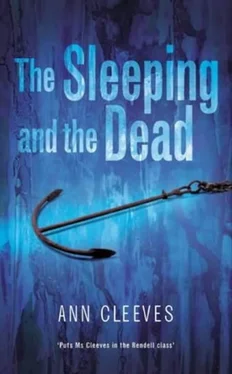‘Of course it does. Alec was there that night. It must have been the last performance, because Hannah Morton says that’s when the Brices were in the audience. No reason why he couldn’t have got hold of the knife. I bet when we check the records we’ll find other lads in his care who’ve mysteriously disappeared.’
‘Theo wasn’t in his care,’ Porteous said. ‘Not as far as we know.’ And Melanie Gillespie wasn’t a lad, he thought.
‘He could have been. Perhaps the Brices asked Alec to have a word with the boy. Perhaps Theo was depressed because of the mess he’d made of his love life and they asked Alec to help. He was always a sympathetic listener. I’ll give him that. Maybe he offered to take Theo out for the day, offered a shoulder to cry on. He was nearer the boy’s age than the Brices. More like a father.’
‘How would he explain Theo’s disappearance?’
‘I’ve been thinking about that.’ Eddie’s words tumbled over each other. ‘Someone told the Brices that Theo had decided to go back to his dad. It must have been Alec Reeves.’
‘It’s certainly a plausible theory,’ Porteous said. Then gently, ‘Where does Melanie Gillespie fit in?’
‘Maybe she’s the last of a string of teenagers who’ve disappeared. We don’t take missing teenagers very seriously, do we? Not the restless, unsettled ones. We put them down as runaways and hope the Sally Army will do the business for us.’
‘Melanie didn’t disappear though, did she? Her body was found. No attempt was made to hide it.’
‘Perhaps Reeves was disturbed. Or all the publicity about the body in the lake made him want to come out into the open. Could be he’s been enjoying the glory.’
Porteous said nothing. He wished he knew more about the subject. Perhaps after all he would have to talk to Hannah’s fat psychologist, ask his advice. He drank his beer absent-mindedly. He hadn’t eaten and felt it go to his head, mixed with the medication he’d taken earlier in the day. Like Stella Randle, he thought, I should take more care.
‘Sir?’ Eddie was on his feet. He was obviously desperate to move the case forward.
‘Peter. Call me Peter here, please.’ He set the glass on the table, stood up too, tried to sound decisive when all he had were questions. ‘I want to know where Reeves is. Don’t go to Sarah Jackson. I don’t want him frightened off. Put a watch on her bungalow. But be discreet. When you find Reeves, don’t pull him in. Tail him but leave him where he is. We’ll need more evidence, any evidence, before we question him. At present he doesn’t know there’s anything to connect him to Theo Randle and that’s how I want it. Show this photograph to the barman in the Promenade who said someone was looking for Melanie. Reeves will have changed since then, but it’s better than nothing. Tomorrow we’ll talk to her parents. See if the name means anything to them.’ He paused. ‘Go easy on this, Eddie. Bet will be expecting you back for a meal. Most of this you can do from home.’
But as Eddie bounded down the stairs Porteous knew he was wasting his breath. Eddie was a man with a mission and was losing the power of rational thought.
When Porteous arrived at the police station the next morning – early for him though he’d still walked, still kept to the same routine – Stout was already there. He looked as if he’d spent all night at his desk. He’d shaved but he was wearing the same clothes and he spoke too quickly, feverish through lack of sleep.
No use to man nor beast in that state, Porteous thought. Then recognized that as the pious sentiment of the newly converted and he listened to the steps Stout had already taken to track down Alec Reeves.
‘There’s an empty bungalow over the road from Sarah Jackson’s. The council were going to do it up before the next tenant anyway. I talked to a chap in building services who goes to our church. He pushed the work to the top of the list. They’re going to start this morning.’ He looked at his watch. ‘Should be there already. I’ve sent Charlie Luke along as part of the team.’
‘Won’t the council workers talk?’
‘No, they think he’s a management trainee. They have to do work experience in every department.’
Porteous smiled at the thought that Luke could pass as management material, but Stout was continuing. ‘He’ll have a key and can let our people in at night. If the neighbours get used to workmen being in the place it shouldn’t cause so much gossip.’
‘Good.’ Porteous thought the plan unnecessarily elaborate. They had no evidence that Reeves would try to contact his sister. But he knew Stout wasn’t in the mood to take criticism. Counselling had taught him the futility of knocking his head against a brick wall.
‘I got an address for Reeves from the DVLA. He lives in a small town in the Yorkshire Dales.’
‘Back to Yorkshire,’ Porteous said. ‘Hannah Morton thought Theo had been at school there but we didn’t get anywhere when we checked earlier. Could Alec have introduced Theo to the Brices, I wonder? I suppose it’s more likely to be coincidence. Theo would have been in a boarding school and Alec a care assistant in a Social Services assessment centre so it’s hard to see where they’d have met. Not that I’ve traced either establishment yet. But it shouldn’t be difficult now.’
‘I’ve found out where Reeves worked.’ Stout was jubilant. Porteous tried to be gracious in his moment of glory. ‘It was a place called Redwood. It wasn’t run by Social Services. Not officially. They bought in places there for difficult kids they couldn’t persuade anyone else to take. It was operated by a charitable trust. It closed about a year ago when the person in charge retired. A woman by the name of Alice Cornish. Apparently she’s famous.’
‘Oh yes,’ Porteous said. ‘She’s very famous.’
He was surprised Stout had never heard of her. Alice Cornish had been committed to providing quality care for children before the improvement of residential services became a fashionable cause. She’d worked in local-authority children’s homes in the late sixties and resigned, very publicly, exposing a series of scandals. The press hadn’t known what to make of her and in some quarters she’d been portrayed as an idealistic but rather hysterical trouble maker. She’d gone on to qualify as a doctor and then to set up an establishment of her own – Redwood – in a farmhouse in the country. Her peers found it hard to understand why she was bothering with grubby and disruptive children when she could be earning a comfortable living within the health service, but her qualifications made them take her seriously. She welcomed research teams into Redwood and they had to admit that her methods worked. She had gone on to be hugely respected in the field of social welfare. She had been made a Dame and chaired committees of inquiry into widespread abuse. Yet still she maintained her personal contact with Redwood and the children who’d lived there spoke of her with great affection. It seemed inconceivable that she would have employed anyone suspected of abuse. Porteous said as much, tactfully, to Stout.
‘She wouldn’t have known, would she? He was never convicted. Never even charged.’
‘I just don’t see how he would have got away with it at a place like that. Dr Cornish’s whole philosophy was about listening to children. The kids wouldn’t have been frightened to talk if Reeves had tried anything on.’
‘He’s clever,’ Stout said stubbornly. ‘Cunning. You don’t know.’
Again Porteous saw no point in arguing. ‘Is Reeves at home now?’
‘I got in touch with the local nick. They sent a community policeman round there yesterday evening. If Alec had answered he’d have got a pep talk about the neighbourhood watch, but nobody was in. According to the neighbours he’s a model citizen, keeps his lawn cut, does his stint driving meals on wheels round the village and – get this – he helps organize the Duke of Edinburgh award scheme at the local high school.’
Читать дальше












